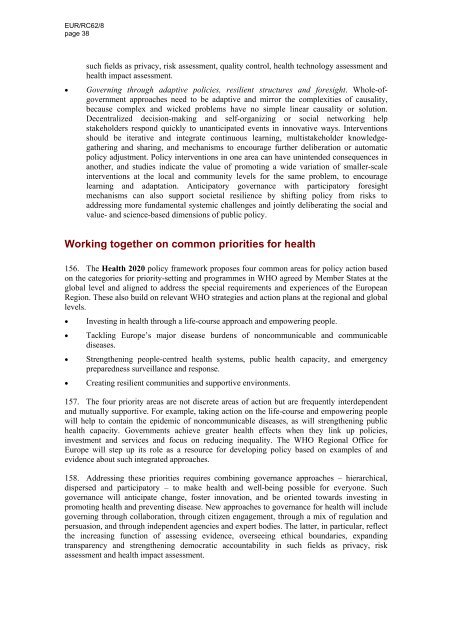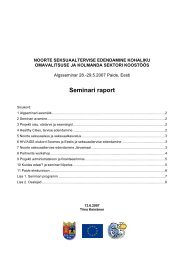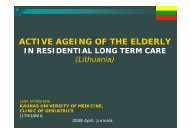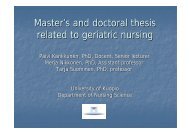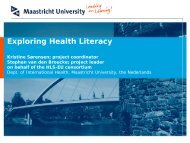EUR/RC62/wd08 (Eng) - WHO/Europe - World Health Organization
EUR/RC62/wd08 (Eng) - WHO/Europe - World Health Organization
EUR/RC62/wd08 (Eng) - WHO/Europe - World Health Organization
Create successful ePaper yourself
Turn your PDF publications into a flip-book with our unique Google optimized e-Paper software.
<strong>EUR</strong>/<strong>RC62</strong>/8<br />
page 38<br />
<br />
such fields as privacy, risk assessment, quality control, health technology assessment and<br />
health impact assessment.<br />
Governing through adaptive policies, resilient structures and foresight. Whole-ofgovernment<br />
approaches need to be adaptive and mirror the complexities of causality,<br />
because complex and wicked problems have no simple linear causality or solution.<br />
Decentralized decision-making and self-organizing or social networking help<br />
stakeholders respond quickly to unanticipated events in innovative ways. Interventions<br />
should be iterative and integrate continuous learning, multistakeholder knowledgegathering<br />
and sharing, and mechanisms to encourage further deliberation or automatic<br />
policy adjustment. Policy interventions in one area can have unintended consequences in<br />
another, and studies indicate the value of promoting a wide variation of smaller-scale<br />
interventions at the local and community levels for the same problem, to encourage<br />
learning and adaptation. Anticipatory governance with participatory foresight<br />
mechanisms can also support societal resilience by shifting policy from risks to<br />
addressing more fundamental systemic challenges and jointly deliberating the social and<br />
value- and science-based dimensions of public policy.<br />
Working together on common priorities for health<br />
156. The <strong>Health</strong> 2020 policy framework proposes four common areas for policy action based<br />
on the categories for priority-setting and programmes in <strong>WHO</strong> agreed by Member States at the<br />
global level and aligned to address the special requirements and experiences of the <strong>Europe</strong>an<br />
Region. These also build on relevant <strong>WHO</strong> strategies and action plans at the regional and global<br />
levels.<br />
<br />
<br />
<br />
<br />
Investing in health through a life-course approach and empowering people.<br />
Tackling <strong>Europe</strong>’s major disease burdens of noncommunicable and communicable<br />
diseases.<br />
Strengthening people-centred health systems, public health capacity, and emergency<br />
preparedness surveillance and response.<br />
Creating resilient communities and supportive environments.<br />
157. The four priority areas are not discrete areas of action but are frequently interdependent<br />
and mutually supportive. For example, taking action on the life-course and empowering people<br />
will help to contain the epidemic of noncommunicable diseases, as will strengthening public<br />
health capacity. Governments achieve greater health effects when they link up policies,<br />
investment and services and focus on reducing inequality. The <strong>WHO</strong> Regional Office for<br />
<strong>Europe</strong> will step up its role as a resource for developing policy based on examples of and<br />
evidence about such integrated approaches.<br />
158. Addressing these priorities requires combining governance approaches – hierarchical,<br />
dispersed and participatory – to make health and well-being possible for everyone. Such<br />
governance will anticipate change, foster innovation, and be oriented towards investing in<br />
promoting health and preventing disease. New approaches to governance for health will include<br />
governing through collaboration, through citizen engagement, through a mix of regulation and<br />
persuasion, and through independent agencies and expert bodies. The latter, in particular, reflect<br />
the increasing function of assessing evidence, overseeing ethical boundaries, expanding<br />
transparency and strengthening democratic accountability in such fields as privacy, risk<br />
assessment and health impact assessment.


